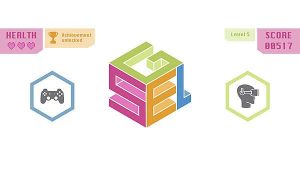 Last Thursday I caught the 8.44am cross country to Plymouth to attend the first Games and Simulation enhanced Learning (GSeL) Conference. GSeL is a newly formed interdisciplinary research theme group, part of Plymouth University’s Pedagogic Research Institute and Observatory (PedRIO).
Last Thursday I caught the 8.44am cross country to Plymouth to attend the first Games and Simulation enhanced Learning (GSeL) Conference. GSeL is a newly formed interdisciplinary research theme group, part of Plymouth University’s Pedagogic Research Institute and Observatory (PedRIO).
VR Hackathon
Plymouth University 2nd November 2017
The main event was on Friday the 3rd, but a session billed for the previous day – ‘Hackathon: VR for Non-programmers’ sounded promising. So, I ventured down a day early to channel my inner geek. I’ve got a basic (but rusty) understanding of coding so hoped that the ‘non-programmers’ tagline was true. Turns out the session was well designed for those with little to no experience. Michael Straeubig expertly guided around 15 attendees with differing skills through the process of creating a simple VR equivalent of ‘Hello World’ over the course of 2 hours.
The Hackathon was a hands on workshop running through downloading a-frame framework template project files from Michael’s github, installing open source software atom.io for editing/coding.
Sounds complicated? Yeah, sort of – but Michael’s laid-back-whilst-enthusiastic delivery helped fill in the gaps and moved at a steady pace we could all keep up with. He guided us through creating our first scene, adding in various 3-dimensional objects, altering their size and colour. Setting up a local server on our laptops via atom.io, we were able to move beyond viewing the 3D space we’d programmed and view it on a pair of budget VR goggles (Google Cardboard) on our smartphones.
It was a great primer for dipping toes/feet/legs into creating simple VR spaces from scratch using free tools. The a-frame project files supplied had additional examples of how to extend and develop. I don’t mind admitting I spent a large part of the rest of the day tinkering. A Michael drily observed during the session, we’d become ‘cool coders’.
Games and Simulation enhanced Learning (GSeL) Conference
Plymouth University 3rd November 2017
A day of talks and workshops based around the use of Games and Simulations, both real-life and digital. Some personal highlights for me included:
Professor Nicola Whitton’s keynote ‘Play matters: exploring the pedagogic value of games and simulation’ which tapped eloquently into themes like Failing without Consequence and motivation/engagement through playing games.
Matthew Barr (University of Glasgow) ‘Playing games at University: the role of video games in higher education and beyond’ – a great talk about his work with ‘gaming groups’ and the benefits cooperative video game playing brought students. “If I ruled the world, every student would play Portal 2”.
James Moss (Imperial College) ‘Gamification: leveraging elements of game design in medical education’ – some brilliant examples of using scenario based games in medical education. ‘Stabed to Stable’ involved scenario/persona based learning, a horizontal whiteboard, post-it notes and pens, with students clustered around trying to map out processes (checks/actions) they needed to go through, whilst James periodically helped guide or threw related spanners into the works. An overhead time-lapse video showed a dynamic session in action. A second game involved teams becoming the ‘medical officer’ helping a team of characters climb Everest. This simulation included mountain noise recordings (incrementally getting louder), random wildcards presenting challenges, lighting changes and James squirting participants in the face with water.
Michael Parsons (University of South Wales) ‘Keeping it Real: Integrating Practitioners in a Public Relations Crisis Simulation’ – shared his experience running a real-time simulation for PR students. Students attempted to handle a recreation of the infamous Carnival Triumph ‘Poop Cruise’ in the University’s Hydra Minerva Suite. The simulation used news report recordings, archived social media posts and live interaction with actors via telephones over several ‘acts’ to simulate a PR teams attempts to handle a particularly disastrous voyage. It all went well till the passengers were close enough to land to get mobile phone reception (and access to social networks).
The conference presented a feast of examples of using games and simulations in teaching and learning. From creating crosswords to utilising digital badges to recognise achievements to data visualisation in Virtual Reality, the place was abuzz with ideas. The focus on the potential of play and gaming to engage students meant the event had something for everyone, whether die-hard techy or strictly analogue.